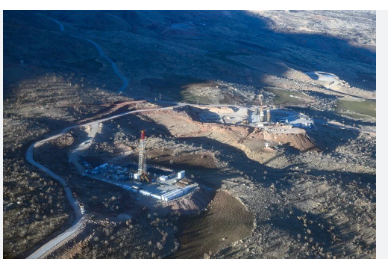Turkish Petroleum (TPAO) has made the largest crude oil discovery onshore Turkey with a find estimated to hold 1 billion barrels of crude, the Turkish company said, according to OilPrice.com.
The discovery was made in the southeastern province of Sirnak, which borders the semi-autonomous Kurdistan Region in Iraq and Syria.
Turkish Petroleum has drilled an exploration well and has encountered more than 162 meters of light oil-bearing reservoir with API gravity of 41.
The well already produces around 10,000 barrels of oil per day, TPAO said.
TPAO plans to drill back-to-back appraisal wells and conduct well tests to have a full-field development plan until the end of this year. Additional exploration activities are planned for the second half of 2023.
The production target is set for 100,000 bpd, which would be more than double Turkey’s oil production.
The exploration success is expected to help achieve Turkey’s energy independence, TPAO said in a statement.
Currently, Turkey depends mostly on oil imports for its consumption.
The country is also targeting natural gas independence with recent huge finds of gas in the Black Sea and the start of gas transmission from the Sakarya Gas Field last month.
In April, Turkish Energy and Natural Resources Minister Fatih Dönmez told broadcaster CNN Türk that the volumes of natural gas that Turkey had found so far in the Black Sea were worth in excess of $500 billion. The huge gas finds would be enough to supply all households in the country for 35 years, or to cover total Turkish natural gas consumption, including from industry, for 15 to 20 years, the minister added.
The newly developed gas fields are set to go a long way toward Turkey’s energy diversification. So far, the country has mostly relied on imports to procure energy supply. The Russian invasion of Ukraine has hit Turkey’s economy and energy prices hard and has made energy imports much more expensive for Ankara.
What Does Erdogan Election Win Mean for Turkiye Oil and Gas?
Overall, we can expect more of the same.
That’s what Enverus’ Regional Manager for the Middle East in the Global Scout Network, Johannes Sobotzki, thinks, according to a statement sent to Rigzone.
“Based on Erdogan’s nationalistic agenda, Türkiye’s national oil company TPAO has significantly ramped up exploration activities over the last few years, including the purchase of four drillships,” Sobotzki told Rigzone.
“This has been somewhat successful, leading in 2020 to the discovery of the Sakarya gas field (>14 trillion cubic feet) in the Black Sea and to the recent announcement of a one billion barrels of oil (in-place) onshore discovery in southeast Türkiye,” he added.
“For 2023, TPAO is planning to drill more than 200 wells,” he continued.
Sobotzki told Rigzone that the aim is to become less reliant on energy imports and reduce the trade deficit.
“At present Türkiye relies heavily on gas imports from Azerbaijan, Iran, and Russia,” he said.
“Greater energy independence would also allow Erdogan to leverage its position as an intermediary for gas being transported through Türkiye to Europe,” Sobotzki added.
At the South Gas Corridor 9th Advisory Board Meeting held in Azerbaijan’s capital Baku back in February, Türkiye’s Energy and Natural Resources Minister Fatih Donmez said the country is open to cooperation for the expansion of gas supplies via the Southern Gas Corridor to allow greater supply security to the European Union, a statement posted on Türkiye’s energy ministry website highlighted.
During a speech in Baku, Donmez said Türkiye offers the most suitable route and the most reliable port for increasing supply security to the EU, the statement pointed out.
“He urged for more cooperation in the face of the energy and climate crises and amid the transition to green energy,” the energy ministry noted in the statement.
“To this end, he said that Turkey is open to cooperation and partnerships to transform the Southern Gas Corridor, the natural gas route from the Caspian and Middle Eastern regions to Europe, into a corridor where green energy can be transported,” the ministry added.
“Currently, negotiations are ongoing to increase the capacity of the corridor to incorporate new energy markets and resources to allow this green energy transformation,” the ministry continued, according to Rigzone.com.
Follow our English language YouTube videos @ REAL TURKEY: https://www.youtube.com/channel/UCKpFJB4GFiNkhmpVZQ_d9Rg
And content at Twitter: @AtillaEng
Facebook: Real Turkey Channel: https://www.facebook.com/realturkeychannel/
